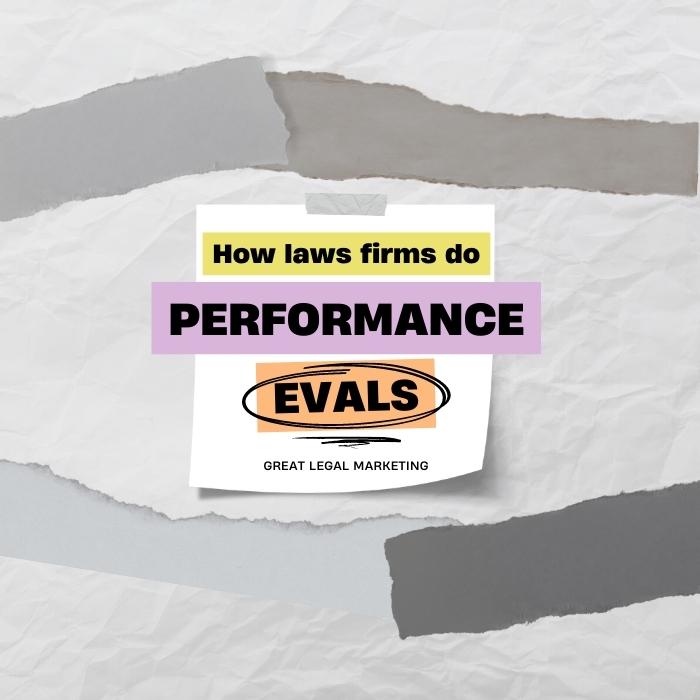
How Every Law Firm Should Do Performance Evaluations
If you own a law firm, you’ve probably thought about doing performance evaluations. Maybe you’ve done them on an intermittent basis. In that case, well done. Or maybe you used to conduct performance reviews every quarter…five years ago.
Sound familiar?
The fact is that most performance review systems are not designed for small businesses. Some systems have several layers of management, which may be unsuitable for your firm. Others fail to produce meaningful results. Designing the right system from scratch may seem too difficult to pursue.
So how can you do performance evaluations at your law firm?
With 3 quick tips I’ll break down how you can start or improve your law firm’s system of performance evaluations.
Establish a Rhythm for Conducting Performance Evaluations
Conducting performance evaluations only once per year is a common mistake many law firms make. These often become salary negotiations instead of actual employee performance reviews.
 To avoid this, I recommend doing evaluations at least twice per year and ideally every six months. Larger practices may consider conducting reviews every quarter. Your target should be to track areas for improvement, making changes as needed.
To avoid this, I recommend doing evaluations at least twice per year and ideally every six months. Larger practices may consider conducting reviews every quarter. Your target should be to track areas for improvement, making changes as needed.
With this being said, don’t abandon hope if you go off track for a bit and fall short of these goals. You can always start again and continue the rhythm as best as possible.
Evaluate Employee Performance from Both Sides
My #1 tip to get more out of every evaluation you do is to incorporate manager and employee participation in performance analysis.
When you present your employees with a self evaluation and rate them separately using the same criteria, two things happen.
- Your employees have a chance to honestly review their performance before speaking with managers.
- You have an opportunity to discuss discrepancies between your employees’ evaluations and your own.
Both results isolate problem areas and work toward finding out their underlying causes.
For instance, one employee may rate his quality of work as a 犀利士
5 on a scale of 1 to 5. You may have rated that same employee’s quality of work as a 3. In a follow-up you discover that this employee wasn’t being overconfident but genuinely believed his work was hitting the mark. You find the issue is no longer about quality, but rather about faulty communication.
Use the Right Categories and Appropriate Scale for your Law Firm
To reflect employee aptitudes, make sure to include the right categories.
You are free to personalize your review’s categories and questions, but be sure to include a “work quality” and “core values” category.
Your “work quality” category can include questions or topics such as:
- Work Quality
- Team Communication
- Time Management
Aim for between 5 and 7 of these “work quality” categories (on a scale of 1 to 5) to include on the evaluation card. Findings from this category help track how well employees adjust to and perform in the firm.
Your “core values” category can feature subjects specific to the law firm’s culture. Start by identifying your law firm’s core values. Your goal is to compare these values with those of your employees. Our coaching programs are a great resource if you’re unsure about your core values.
Grading employees against these values ensures everyone is on the same page with how they operate as a team and with decisions they make on behalf of their clients. Furthermore, it facilitates meaningful discussions about employees’ attitudinal alignment with your firm.
Once you decide on categories, set an appropriate scale to evaluate performance with. A scale of 1 to 5 is ideal. If you choose otherwise, make sure you and your employees use the same range for the best comparisons.
A Review of How to Conduct Performance Reviews in Law Firms
When designing a performance evaluation system, keep these steps in mind then adjust to your law firm’s needs. A steady, frequent rhythm will promote accountability. A two-sided review system will encourage mutual discussion. An appropriate ranking scale will ease comparison. And pertinent categories will deliver useful results.
The best performance evaluations for your law firm will ensure a better holistic outcome as a team, increase productivity, and produce better performance from all team members.

Most attorneys start their firms assuming that being a really, really good attorney should, in and of itself, be a marketing advantage. Those attorneys believe that joining a whole bunch of committees and putting their name in lawyer directories is “marketing,” and they never bother to ask if there is a better way.
Attorneys are catching on, however, and those who succeed learn to leverage their current resources to create effective (and ethical) marketing. What they discover isn’t a magic pill or silver bullet but a different approach to marketing that your competitors haven’t considered.
If you want a peek at what successful attorneys use to market their practice, the HERO Starter Kit is your logical next step.
We’ve put together a FREE (and potentially life-changing) kit for solo and small firm attorneys that will show you a better way to reach potential clients and get them excited to call your firm. Request your HERO Starter Kit from Great Legal Marketing!
by Ben Glass
Ben is a nationally recognized expert in attorney marketing and the owner of Great Legal Marketing.
